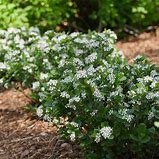Aronia Low Scape Mound
$39.99
Low-growing groundcover shrub, providing beauty from spring through frost. Low Scape Mound aronia is a tough, tolerant, tidy little mound of glossy green foliage. In spring, it's covered in hundreds of dainty white flowers, and in autumn, the leaves turn brilliant red to contrast with dark purple-black fruit. The unique low-growing, mound-shaped habit of this new variety makes it perfect for mass planting as a ground cover or edging plant as it spreads outward via suckers. It naturalizes a space beautifully. Best of all, it thrives almost anywhere: cold climates and hot ones, wet soils and dry ones, sun and part shade. This native shrub will gracefully handle just about any landscape challenge you can throw at it! Top three reasons to grow Low Scape Mound aronia:
– Low-growing, mounded habit, perfect for edging and groundcover
– Tolerates a wide range of growing conditions
– White flowers in spring; Dark purple fruit and brilliant fall foliage.
Best Seller
Fall Interest
Heat Tolerant
Deadheading Not Necessary
Drought Tolerant
Salt Tolerant
Erosion Control
Bog Plant
Native to North America
Characteristics
Plant Type: Shrub
Shrub Type: Deciduous
Height Category: Short
Garden Height: 18 – 36 Inches
Spacing: 18 – 36 Inches
Spread: 18 – 36 Inches
Flower Colors: White
Foliage Colors: Green
Foliage Shade: Green
Habit: Spreading
Container Role: Spiller
Plant Needs
Light Requirement: Part Sun to Sun
Sun
The optimum amount of sun or shade each plant needs to thrive: Full Sun (6+ hours), Part Sun (4-6 hours), Full Shade (up to 4 hours).
Maintenance Category: Easy
Blooms On: Old Wood
Bloom Time: Mid Spring
Hardiness Zones: 3a, 3b, 4a, 4b, 5a, 5b, 6a, 6b, 7a, 7b, 8a, 8b, 9a
Water Category: Average
Uses: Border Plant
Container
Edging Plant
Groundcover
Landscape
Lawn Substitute
Mass Planting
Uses Notes: Aronia Growing Guide
Maintenance Notes: Aronia is one of the toughest, most durable shrubs, and needs little care. If you wish to prune, the best time is immediately after it blooms. However, be aware that this will remove the potential for any fruit to form. Wondering about deer resistance? It varies. We have found that in areas with heavy deer or rabbit activity, they may eat the flower buds in early spring, when food supplies are scarce. However, they do not typically continue browsing aronia after that, so are unlikely to cause severe or disfiguring damage to the plant itself.
Fun Facts:
Aronia's common name, chokeberry, comes from the extremely astringent taste of the fruit.
Low Scape Mound® Aronia melanocarpa 'UCONNAM165' USPP 28,789, Can 6,519
Additional information
13 in stock

